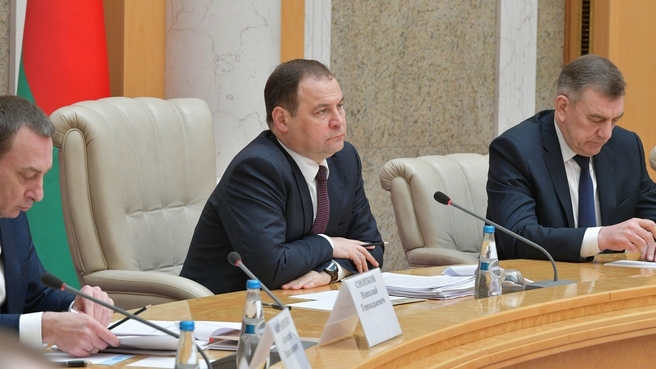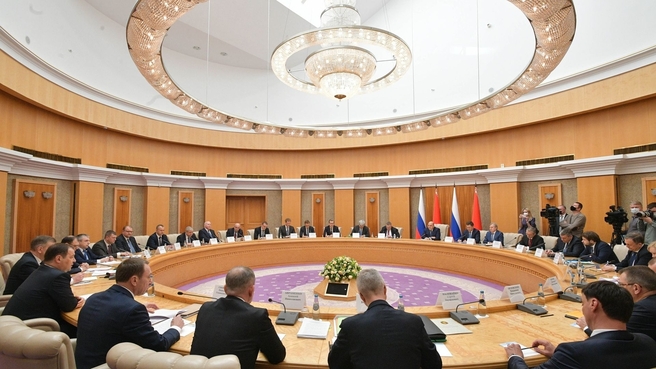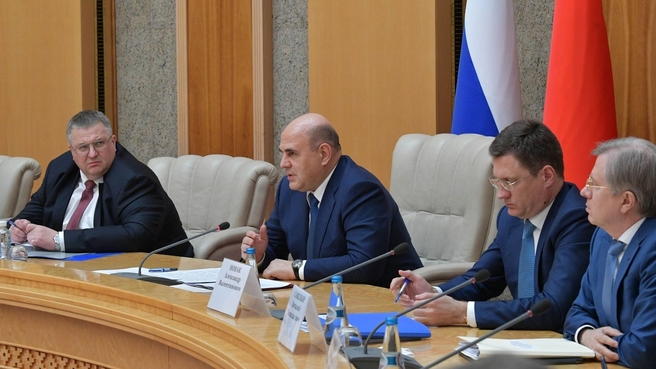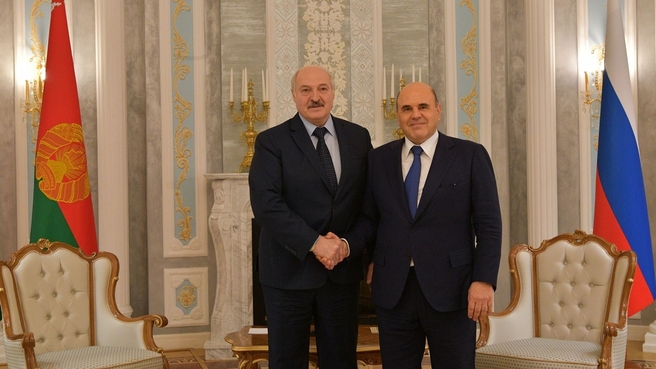Talks took place during Mikhail Mishustin’s visit to the Republic of Belarus.
Excerpts from the transcript:
Roman Golovchenko: Esteemed Mr Mishustin, members of the delegation, welcome to the Hero City of Minsk. Prime Minister Mishustin already met with President Lukashenko. The delegation members had a chance to talk, all the more so as we have had many productive contacts lately.
In early 2021, we see a very encouraging trend towards restoring bilateral trade to its former level. The growth rate of exports of Belarusian goods to Russia in January-February was about 105 percent, and for exports of Russian goods to Belarus it was almost 125 percent.
Integration in the economic sphere is a bilateral priority. Working together, our experts have developed proposals to deepen economic integration, and this package is formally ready to go. But there are issues on which substantive consensus has not yet been achieved. Basically, these are matters of practical importance for leveling the field for our economic agents. These are complex and sensitive questions, but turning a blind eye to them will lead us nowhere, because without finding proper solutions, we will never be able to fully open up to each other economically or to build an economy befitting a real union and implement actual cooperation projects.
Our cooperation in transshipment of Belarusian petroleum products through Russian seaports can serve as an example of how challenging bilateral issues can and should be resolved. Just a month ago, two months at most, we started working on it, and today over 220,000 tonnes of foreign trade cargo of the Republic of Belarus have already been shipped through Russia’s seaport infrastructure. To reiterate, this is a good example of how truly difficult practical matters can be promptly resolved with proper motivation and action, as well as support at the level of our countries’ respective leaders.
I can cite many such examples over the last quarter or months. Take, for instance, the rollout of the Sputnik V vaccine in the Republic of Belarus, which started on 25 March. I would like to thank you, Mr Mishustin, for your unwavering support for this project and the decisions taken to help jump start vaccine production in Belarus.
I would like to see other issues resolved promptly as well. I’m confident that this approach will lead to positive outcomes in all our joint projects.
Of course, the slow recovery of free movement across the Belarusian-Russian border still constrains the economy. For this reason, Mr Mishustin, as we talked about this today, we must gradually return to normal pre-pandemic traffic levels. That said, we should be mindful of the virus and of course, we should not forget about public health precautions.
Perhaps, initially, we should focus on ways to organise free movement for business purposes. This will give an additional boost to interregional relations and serve as a positive signal to the business community to expand cooperation.
Mr Mishustin, as always, we stand ready to discuss the entire range of existing issues in an open, constructive manner in order to find the solutions that we have outlined for ourselves.
Thank you. Over to you, Mr Mishustin.
Mikhail Mishustin: Esteemed Mr Golovchenko and esteemed participants in our meeting,
To begin with, I would like to thank you for the warm reception given to the Russian delegation. I am always happy to visit Belarus, to go to Minsk.
Mr Golovchenko, we are always in touch with you. Quite recently, in January, we saw each other in Moscow, and in February, we met at the Eurasian Intergovernmental Council meeting in Alma Ata. We constantly speak on the telephone. As I have already said today, members of the Government of the Russian Federation, ministers and departmental employees maintain continuous, literally everyday contacts with their Belarusian colleagues. We are addressing all the major issues of our cooperation, primarily in trade and the economy.
We cherish our fraternal relations and certainly want to upgrade them. You have said this as well. Integration cooperation in the Union State that we discussed in detail today, including with President of Belarus Alexander Lukashenko, is a very important matter. We are firmly convinced that we will be able to build it up all on our own. As we said today, we must use the opportunities of this cooperation and integration for the benefit of both sides, to improve the efficiency of our economies.
Our cooperation was crucial during the pandemic. We helped each other with test systems. Industrial production of the Russian Sputnik V vaccine was launched in Belarus on 25 March. This is a very welcome development. We also know about the vaccines that Belarus is getting ready for industrial production. We are restoring transport links with the normalisation of the epidemiological situation. Thus, we will launch the Moskva-Minsk Lastochka train project on 30 April. We are going to reinstate the railway connection with Sochi as well. A high-speed train will also run daily to Minsk as I have already mentioned. I hope air traffic will gradually return to pre-pandemic levels in terms of transshipments, passenger and cargo flows.
In general, our trade and economic cooperation is making headway. Our trade has become a bit better after a decline during the peak of the pandemic. Now it is about $29.5 billion. I hope we will soon completely reverse the negative trend and increase our mutual trade.
I would like to mention by way of example that we have carried out our joint project on export supplies of Belarusian oil products via Russian ports. We signed a relevant intergovernmental agreement in February and as you said, this project shows how quickly we can resolve various issues, including logistics.
During my visit, we are also going to sign an airworthiness agreement between the aviation authorities of Russia and Belarus. First of all, it will simplify the procedure for approving and validating supplies of Russian civilian aviation equipment to Belarus.
I also hope we will discuss joint measures on implementing the tasks set before us by our presidents – Vladimir Putin and Alexander Lukashenko.













